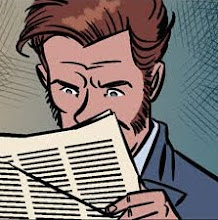Here's a rough of Dr. Watson for one of the pages I'm working on right at this very moment for Hound of the Baskervilles. Thought I'd take a quick snap shot and post it here.
The wet proofs for a handful of test pages arrived yesterday morning from the printers so I could see how the color would print and I'm rather pleased and excited.
Now then. About Dr. John H. Watson:
IN the year 1878 I took my degree of Doctor of Medicine of the University of London, and proceeded to Netley to go through the course prescribed for surgeons in the army. Having completed my studies there, I was duly attached to the Fifth Northumberland Fusiliers as Assistant Surgeon. The regiment was stationed in India at the time, and before I could join it, the second Afghan war had broken out. On landing at Bombay, I learned that my corps had advanced through the passes, and was already deep in the enemy's country. I followed, however, with many other officers who were in the same situation as myself, and succeeded in reaching Candahar in safety, where I found my regiment, and at once entered upon my new duties.
The campaign brought honours and promotion to many, but for me it had nothing but misfortune and disaster. I was removed from my brigade and attached to the Berkshires, with whom I served at the fatal battle of Maiwand. There I was struck on the shoulder by a Jezail bullet, which shattered the bone and grazed the subclavian artery. I should have fallen into the hands of the murderous Ghazis had it not been for the devotion and courage shown by Murray, my orderly, who threw me across a pack-horse, and succeeded in bringing me safely to the British lines.
- (Being a reprint from the reminiscences of JOHN H. WATSON, M.D., late of the Army Medical Department), A Study in Scarlet.
'No small part of our author's genius was his ability to tell a story so persuasively that it sounded like a narration of fact.'And it's that no small part of his genius that brings me to Dr. Watson and the Battle of Maiwand. Whilst many may know of Watson through Nigel Bruce's portrayal of a bumbling baffoon, Sir Arthur Conan Doyle portrayed Holmes' chronicler, Dr. John H. Watson as a capable and brave man - a 'whetstone' for Holmes' mind.
The bravery of the English soldiers that fought in the Battle of Maiwand was noted by an Afghanistan officer. The British had lost and were down to 11 men.
"These men charged from the shelter of a garden and died with their faces to the enemy, fighting to the death. So fierce was their charge, and so brave their actions, no Afghan dared to approach to cut them down. So, standing in the open, back to back, firing steadily, every shot counting, surrounded by thousands, these British soldiers died. It was not until the last man was shot down that the Afghans dared to advance on them. The behaviour of those last eleven was the wonder of all who saw it".Now, given that Watson survived he clearly wouldn't have been one of the final eleven (if we marry fact with fiction for a moment as Doyle suggests) but another matter cements his courage and devotion to my mind.
In 'A Study in Scarlet' (re: above) it states that Watson was shot in the shoulder (wounded by a Jezail bullet), and its this wound that had him pulled out of active service. In 'The Sign of Four' (another of the books we're adapting), he makes reference to a war wound in his leg.
'I made no remark, however, but sat nursing my wounded leg. I had a Jezail bullet through it some time before, and, though it did not prevent me from walking, it ached wearily at every change of the weather.'Which was it, the shoulder or the leg? That's something that's sometimes been a matter of debate. Well, if our Watson served at the battle of Maiwand and if the description given by the Afghanistan officer is anything to go by then the answer's quite simple as I see it. It was both. Not only that, but Watson was already significantly wounded before he took the bullet in the shoulder which retired him from the battlefield for good. Had he, even wounded, tried desperately to save lives in the chaos that was the battlefield of the Maiwand? Watson was a courageous and devoted man and yet he himself is quick to note the devotion and courage of another! In factual context, Watson was truly an exceptional fellow.

















2 comments:
I think that pretty much dispels the notion that Watson is a bumbling buffoon. He was a brave man and being a doctor, unlikely to be all that stupid.
Perhaps the idea of him being a bit of a fool is another way of showing his humility and lack of ego? It allows Holmes to shine all the more. A front, if you will? Which has probably been depicted in some movie or other before now, I'm sure.
I'm reading all the short stories at the moment, I haven't read all that much Holmes and it's a real treat.
On a side note, I received the Dorian Gray book for Christmas and damn fine it is too. Congratulations to you and Ian for producing a bloody good adaptation.
Well exactly. He was a doctor and his medical knowledge always proved of immense value to Holmes.
I think having him played the fool was a way of magnifying Holmes' intellect (when it didn't really need magnifying).
I'm glad you liked the Dorian Gray book. Thank you!
Post a Comment